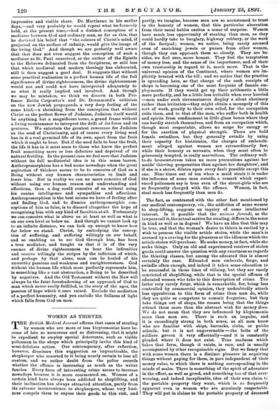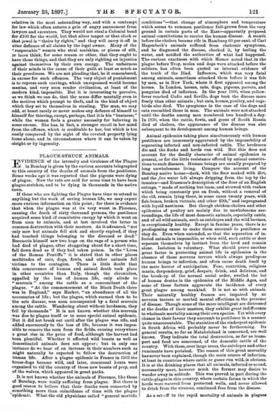WOMEN AS THIEVES. partly, we imagine, because men are so
accustomed to trust in the honesty of women, that this particular aberration from their usual habits excites a sense of surprise. Women have much less opportunity of stealing than men, as they could hardly take to burglary, highway robbery, or the work of the footpad ; women, we notice, being rarely accused even of snatching jewels or purses from other women, though they can approach them so closely. They are be- sides, we feel sure, more honest. They feel the temptation of money less, and the sense of its importance, and of their own trusteeship in regard to it, much more. That is the universal opinion of the Continent, where women are im- plicitly trusted with the till ; and we notice that the practice is spreading here, so that charge of the cash receipts of shops is becoming one of the most frequent of female em- ployments. If they would get up their arithmetic a little more perfectly, and be a little less irritable when over hurried —men under such circumstances display a silent obstinacy rather than irritation—they might obtain a monopoly of this sort of work, greatly to their own relief, for the occupation snits them, and to that of the men, who suffer both in health and spirits from confinement in little glass boxes where they can hardly stretch themselves, and from an occupation which, though most respectable, allows no scope for energy or for the exertion of physical strength. There are bold female swindlers, but they generally swindle by using their capacity for histrionics, the charges of embezzle- ment alleged against women are extraordinarily few, while their honesty as servants, when they must often be grievously tempted, is really marvellous. The ordinary well- to-do housemistress takes no more precautions against her maids' thieving propensities than against her daughters', and if she is a shrew, dilates upon every fault possible except this one. Nine times out of ten when a maid steals it is under the influence of some man outside, a remark which experi- enced policemen say is true even of the street-girls who are so frequently charged with the offence. Women, in fact, steal much less frequently than men do.
The fact, as contrasted with the other fact mentioned by our medical contemporary, viz., the addiction of some women to shop-lifting, suggests an inquiry of some intellectual interest. Is it possible that the animus furendi, as the lawyers call it, the actual motive for stealing, differs in the sexes in kind as well as in degree ? We have an idea that this may be true, and that the woman's desire to thieve is excited by a wish to possess the visible article stolen, while the man's is aroused by a craving for the pleasures or the idleness which the article stolen will purchase. He seeks money, in fact, while she seeks things. Only an old and experienced receiver of stolen goods could answer the question with any exactness as regards the thieving classes, but among the educated this is almost certainly the case. Educated men embezzle, forge, and swindle often enough, and indeed it takes some education to be successful in those lines of villainy, but they are rarely convicted of shoplifting, while that is the special offence of educated women who take to this description of crime. The latter very rarely forge, which is remarkable, for, being less controlled by commercial opinion, they undoubtedly attach less opprobrium to this form of crime than men do, while they are quite as competent to commit forgeries; but they take things out of shops, the reason being that the things attract them more than the abstract wish for money does. We do not mean that they are influenced by kleptomania more than men are. There is such an impulse, and it is exceedingly strong in both sexes, as all men know who are familiar with ships, barracks, clubs, or public schools; but it is not ungovernable — the belts of the soldiers govern it very effectually—and it is constantly pleaded where it does not exist. True madness which takes that form, though it exists, is rare, and is usually accompanied by other recognisable signs. But we fancy that with some women there is a distinct pleasure in acquiring things without paying for them, in part independent of their money value, to which there is nothing corresponding in the minds of males. There is something of the spirit of adventure in the effort, as well as greed, and something too of that over- weening, and indeed inexplicable, idea of their own claim to the portable property they want, which is so frequently apparent even in women who are genuinely respectable. They will put in claims to the portable property of deceased relatives in the most astounding way, and with a contempt for law which often extorts a grin of angry amusement from lawyers and executors. They would not steal a Colonial bond for £100 for the world, but that silver teapot or that clock or that jewel is "theirs by rights," and they will carry it off in utter defiance of all claims by the legal owner. Many of the "respectable" women who steal sealskins, or pieces of silk, Dr laces think, for some reason or other, that they ought to have those things, and that they are only righting an injustice against themselves by their own energy. The unfairness of their minds is the cause of their guilt at least as much as their greediness. We are not pleading that, be it remembered, in excuse for such offences. The very object of punishment is to repress such cravings, which unrepressed would become manias, and very soon render civilisation, at least of the modern kind, impossible. But it is interesting to perceive, as we think we can do, that the sexes differ mentally even in the motives which prompt to theft, and in the kind of object which they set to themselves in stealing. The man, we may add, at heart rarely or never makes any defence of himself to himself for thieving, except, perhaps, that it is his "business;" while the woman feels a greater necessity for believing in some excuse. She has, in fact, a stronger recoil in her mind from the offence, which is creditable to her, but which is too easily conquered by the sight of the coveted property lying loose about, and in circumstances where it can be taken by sleight or by ingenuity.



































 Previous page
Previous page